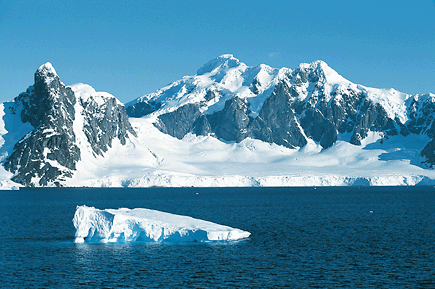Antarctica Melting Much Faster Than Believed
December 28, 2012
The West Antarctic Ice Sheet is warming significantly faster than scientists had estimated, according to a study published in the journal Nature Geoscience. The authors of the study revealed that the average temperature at a research station in the middle of West Antarctica has risen by 4.3 Fahrenheit degrees (2.4 Celsius degrees) since 1958–roughly twice as much as scientists previously believed and three times the overall rate of global warming. Particularly surprising was the discovery that although most of the Antarctic warming took place as expected in the spring (September, October, and November in the Southern Hemisphere), some warming occurred in the summer (December, January, and February). Scientists had thought that temperatures in the Antarctic remained relatively stable during the summer.
This alarming report follows another recent study, which found that melting in West Antarctica has accelerated by about 50 percent since 1992. That study, published in November by 47 climate scientists from 26 labs around the world, also found that Greenland’s ice sheets are melting at a rate five times faster than they were in the 1990’s.

Ice and snow cover 98 percent of Antarctica, the world's coldest region. (© Rod Planck, Photo Researchers)
The West Antarctic Ice Sheet is the part of Antarctica that lies west of the Transantarctic Mountains and is mainly in the Western Hemisphere. Because of the enormous weight of the ice there, the terrain under the ice sheet is an average of 3,300 feet (1,000 meters) below sea level. At the ice sheet’s edge near the Southern Ocean, broad, flat, floating ice shelves fill several of Antarctica’s bays and channels. Those ice shelves, along with the ice in the interior, comprise about 90 percent of the world’s ice. Scientists have calculated that if all of Antarctica’s ice melted, Earth’s oceans would rise nearly 230 feet (70 meters), flooding coastal cities around the world. The November study of ice sheets in both polar regions found that the melting there has caused nearly a ½ inch (11 millimeters) rise in in sea level since 1992, or about 20 percent of the overall rise.
One of the scientists involved in the new study, Andrew J. Monaghan of the Colorado-based National Center for Atmospheric Research, noted “When you see this type of warming, I think it’s alarming.”
Additional World Book articles:
- Exploration (the Exploration of Antarctica)
- Glacier
- Global warming (2009) (a Back in Time article)
- The Great Meltdown (a special report)
- Science in Antarctica (a special report)


